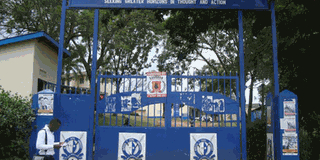Infighting stifles growth of Muteesa varsity

The entrance into Muteesa 1 Royal University - Masaka Campus. Photo by Martins E Ssekweyama.
What you need to know:
Since its inception in 2007, Muteesa 1 Royal University has had four vice chancellors. Two of them were forced out through strikes initiated by students with the backing of some staff members
New students of Muteesa I Royal University main campus at Kirumba –Masaka had a scary start to this academic year following a violent strike that left the vice chancellor’s (VC) official car and other property vandalised.
Although the fresh students were eventually enrolled on September 5, and continuing students a week later, a thick cloud of uncertainty still hovers over the future.
The university, a Buganda Kingdom-owned institution of higher learning, has had unsettled environment and leadership since its inception in 2007. Its detractors have over years targeted individual vice chancellors, but not the problems facing the university. Although the previous strikes, and the one last month, were led by students, insiders say the students have always had the backing of some ill-intentioned officials within the kingdom administration.
Students accuse their vice chancellor Prof. Arthur Sserwanga of running down the institution, failure to reside at the main campus, incompetence, poor feeding, bad learning environment, unpaid teaching salaries and unreasonable suspension and expulsion of some staff as well as failing to phase out asbestos roofing sheets on lecture rooms.
Sserwanga is not the first VC to be accused of the same .
Prof. Yusuf Nsereko Munakukaama, the university’s first VC left the university in 2011 under unclear circumstances. He sued the university and the matter was settled out of court. It is understood the university compensated him.
Another VC, Prof. Elisha Semakula also left the university, frustrated by its working environment. In fact, he suffered a bigger embarrassment when students at the university’s main campus in Masaka, went on strike and locked him up in a toilet over alleged failure to transform the institution.
Prof Isaac Kigongo Bukenya who acted as VC for a couple of years before the appointment of Prof. Sserwanga did not salvage the institution’s work environment.
Sserwanga, who inherited a host of structural and institutional problems, is reportedly unhappy with the way his employers have treated him.
In a recent interview, he sounded committed to soldiering on towards transforming the university from the limbo it had sunk into.
Late last month, his official car was vandalised by striking students after they attacked him and other university council members in a meeting with the new chancellor, Justice Julia Sebutinde. They were saved by the police before the university was closed.
Just like in the previous strikes, the students demanded for the VC’s resignation or suspension.
Prof. Sserwanga took up the mantle unaware of the intensity of the hushed up problems at MRU. As an academic, he was unaware of the infighting at Mengo that would take a toll on him.
He, however, moved in to fix them. By the time he took office, the university had arrears amounting to Shs5b, even when its budget was only Shs6b in total then.
Salaries were paid using loans from banks and well-wishers. The university’s facilities were in a very poor state and there was no access to internet.
Uganda Revenue Authority and National Social Security Fund were on the verge of closing the university due to taxes and other arrears amounted to over Sh1billion. Also there had never made any attempts to apply for a charter.
In order to appreciate the dire need for transformation, reference is made to a damning 2015 National Council for Higher Education report on MRU.
During Prof Sserwanga’s tenure, the university has cleared 95 percent of the inherited arrears, made modest repairs on the old and dilapidated infrastructure, improved internet connectivity, cleared URA and NSSF arrears and applied for a charter. These are no mean feats.
Despite these achievements, there is squabbling about the vice chancellor’s personality from the students and staff, which some intend to use to floor his competence.
There are diverse opinions on the person and his management style. A number of people who have closely worked with Prof. Sserwanga describe him as a professional and qualified education leader.
However, he is accused of being too strict on performance, which actually falls directly under his docket.
Sources say those against the transformation of MRU want to bring down Prof. Sserwanga with disgrace by personalising the problems despite his efforts to solve them.
And the strategy seems to be working. It has disorganised MRU management, including department heads that were transformative such as the university bursars, director of examinations, among others.
Genesis of Prof. Sserwanga’s woes:
Sserwanga’s problems started early this year, when he effected a restructuring exercise that intended to reduce the wage bill.
In the process, expired contracts of 47 teaching and non-teaching staff were not renewed.
It is understood that some of these staff would soon leave the university, which they say, has toxic work and academic environment. Many have written several petitions to the chairman of the University Council, Minister of Education and many Buganda Kingdom officials.
In the petitions, the staff attempted to blackmail the Council chairman, Dr Frank Ssebowa and threatened to harm Prof. Sserwanga and other MRU officials, which led to the stepping up of security since January 2016 for the safety of the vice chancellor.
Daily Monitor has also learnt that the decision to sack the staff was arrived at, during December 2015 Buganda retreat. Then, the kingdom cabinet approved a proposal by Katikkiro Charles Peter Mayiga to retain a limited number of staff that can be well catered for, to ensure efficiency in services delivery.
In fact, the affected staff, some related to high-placed personalities in Mengo, sued the institution and demanded for colossal sums of money as compensation.
In spite of the ongoing negotiations with authorities (the Katikkiro’s office at a centre line) to solve the standoff, some of these individuals turned their wrath on Prof. Sserwanga to the extent of instigating a students’ strike to coerce him out of the university.
The aim of the restructuring was to convert MRU from a job-focused institution into a customer-focused institution where administrative and academic staff see their work as a solution to societal needs rather than just a job to be done.
Sserwanga, who has an accounting background, has pushed for financial frugality. Such reforms earned him more enemies who were benefitting from gaps in the institution.
Prof. Sserwanga responds:
But with a less confrontational stance he accords to his assignments and priorities, Prof. Sserwanga is trying to survive the double edged swords at the MRU.
“In a university, there are debates and there are issues to dialogue on. If someone chooses to force people to go any how, whom are you going to dialogue to find solutions to the problems.”
On how he intends to renew his relationship with students who attempted to harm him during the strike, Prof. Sserwanga insists that they had been feed on falsehoods which “ I have already diluted”.
He met with the students and their leadership, and agreed on a mutual contract with either side committing to regular dialogue about the affairs of the institution other than individuals.
“We agreed to lift our discussions from personal to institutional level. The students have equally appreciated that once we do this we get near to the real challenges and understand why some are taking long to be addressed. There is that much we have done and a lot is yet to be done,” he explained.
Prof. Isaac Kigongo Bukenya, the deputy vice chancellor, says he has high hopes in Prof. Sserwanga steering the university to the desired heights.
According to him, Prof. Sserwanga could be a victim of situational circumstances that have made strikes the order of the day.
“Student strikes have become a common practice in all institutions, whenever they get what they consider to be grievances. But we are developing mechanisms that this university does not experience more strikes,” Bukenya noted. Among other interventions, they are going to hold monthly meetings with the students at all campuses.
He also backs Prof. Sserwanga’s transformation ideas, saying they give a clear vision of the university’s future.
Vincent Mayiga, the Kabaka’s representative in Buddu county, who also has vast experience in public administration, says the challenges are fevers of change and transformation at the to university.
“Our people were used to on old mode of leadership and when subjected to administrators that are vigorous, you automatically expect some resistance, and such characters just fall off the system or get adopted to it as time passes,” he says.




